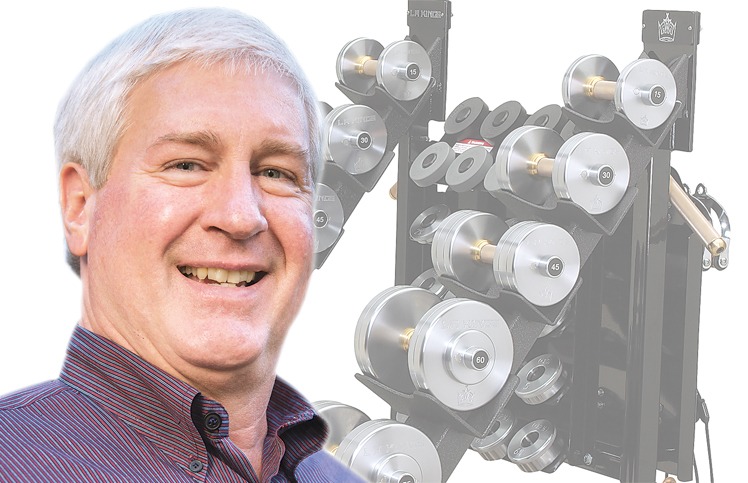After graduating from the United States Military Academy at West Point Tom Grace, owner and president of Vancouver-based Black Iron Strength, followed up with a career in the army. His last assignment before taking early retirement set the tone for the next stage of his life.
“I was director of instruction for the department of physical education,” Grace said. “So while I was at West Point I was one of the key buyers for fitness equipment. I was able to take that skill-set and turn it into a civilian job.”
Black Iron Strength is a high-end free weight company that caters to the upper part of the market, such as private fitness facilities and professional and college athletic teams. Launched in 2001, it has more than held its own during a time when the majority of the free weight industry moved to Asia. This all USA-manufactured product line has 13 product categories, 13 U.S.-awarded patents and three more pending which, according to Grace, translates to Black Iron holding more intellectual property than the entire free weight industry combined.
While Grace runs the distribution center from the company’s NE Vancouver headquarters, four full-time employees work out of a factory in Southern California. Black Iron ships to customers worldwide.
From conventional dumbbells and barbells to kettlebells, cable attachments and Olympic training bars, the product line at Black Iron features design elements specifically requested when soliciting the input of top athletes, coaches and trainers.
Commitment to health is paramount at Black Iron as seen in their most recent line of offerings – CuLean antimicrobial copper handles by CuVerro. Utilizing the inherent anti-bacterial properties of copper, Grace is on the cutting edge to substantially reduce the number of athletes sidelined by bacterial infections such as MRSA and C-diff.
According to the CDC (Centers for Disease Control and Prevention), 75,000 people died in 2011 from health care-associated infections (HAI) in a hospital setting and, although 2013 data compiled in the National and State Healthcare Associated Infections Progress Report showed improvement in key areas, there’s still much work to be done.
The spread of infection is not concentrated within health institutions alone. Community-associated settings are at risk with sports teams being one of the most common. Just last month, Daniel Fells, a tight end for the New York Giants, contracted MRSA and, after multiple surgeries to save his foot, it is being reported that he will not return to football.
“I recognized years ago that a dirty part of fitness rooms is the free weight handles,” said Grace. “Any bacteria left on these handles can get into a slight skin opening.”
Copper and its bacteria-killing properties has been used for thousands of years, but the metal is now making a resurgence due largely to the prevalence of antibiotic-resistant bacterial infections.
Long aware of the personal and financial loss of bacterial infections, the realm of professional sports is taking notice. After winning the 2014 Stanley Cup Championship, the Los Angeles Kings outfitted their strength and training facility with Black Iron Strength dumbbells and attachments made with CuVerro and recently the St. Louis Blues became the second NHL team to follow suit.
Grace’s goal is to be the world leader in anti-microbial copper touch points on free weights and, with a utility patent on their product beyond the design patent, that goal seems within reach.
“We’ve come up with something no one’s ever done,” he said. “Here you have this little tiny company in Vancouver, Washington that’s doing something just extraordinary.”



